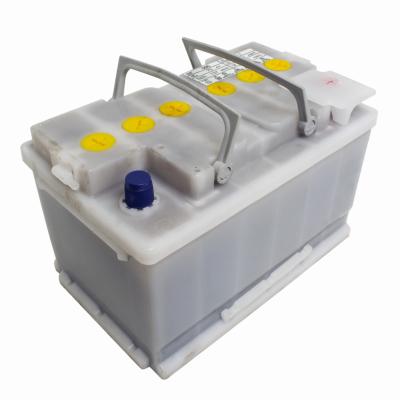
Automobile batteries function differently at certain temperatures and states of charge. A battery's effectiveness, or cranking amps and cranking duration, depend upon the outside ambient temperature, with colder temperatures making batteries work harder. The state of the battery's charge, ranging from 100 percent full charge to a complete discharge of 0 percent, will determine at what approximate temperature a battery's electrolyte will freeze, unable to produce voltage. A vehicle owner can calculate when his battery will freeze, by knowing the charge rate of his battery in relation to the outside air temperature.
Remove the cell caps on the battery, for a low maintenance, lead acid type. Put on safety goggles and gloves for protection. Dip a hydrometer into one cell at a time and draw up enough electrolyte to suspend the indicator float. Mark down your readings on each cell with pen and paper. You will want to read the specific gravity on each cell, and it will be expressed in numerals like 1.190 or 1.225. Use a thermometer to record the outside ambient temperature.
Hook up the positive (red) lead of a voltmeter to the "+" or positive terminal of the battery, and the negative (black) lead of the voltmeter to the negative terminal of the battery. Record the standing voltage. Such a number might read 12.65 volts or slightly under. A voltmeter will work on batteries that have a maintenance-free style designation, such as an AGM, which stands for absorbed glass mat, or on gel-type maintenance-free batteries. However, some claims exist that the AGM and gel-type batteries will not freeze, but it is wise to keep them in the same state of charge as the lead acid-type batteries during cold or freezing temperatures.
Calculate that your battery electrolyte will freeze at approximately minus 77 degrees Fahrenheit if your battery has a full state or 100 percent charge. A battery with a full state of charge will have a specific gravity of 1.265 (hydrometer reading), and indicate 12.65 standing volts (voltmeter reading).
Calculate that your battery electrolyte will freeze at approximately minus 35 degrees Fahrenheit when your battery has a 75 percent state of charge. A 75 percent state of charge will show a 1.225 hydrometer specific gravity, and a reading of 12.45 standing volts.
Calculate that your battery electrolyte will freeze at approximately minus 10 degrees Fahrenheit when it has a 50 percent state of charge. A 50 percent state of charge will show a 1.190 specific gravity, and 12.24 standing battery volts.
Calculate that your battery electrolyte will freeze at approximately 5 degrees Fahrenheit when it has a 25 percent state of charge. The specific gravity will be approximately 1.160 and have a standing voltage of 11.769. This battery will not have a strong-enough charge to start a vehicle in even a more favorable temperature.
Calculate that your battery electrolyte will freeze at approximately 20 degrees Fahrenheit if it is completely discharged. You will show no specific gravity reading or any volt reading.